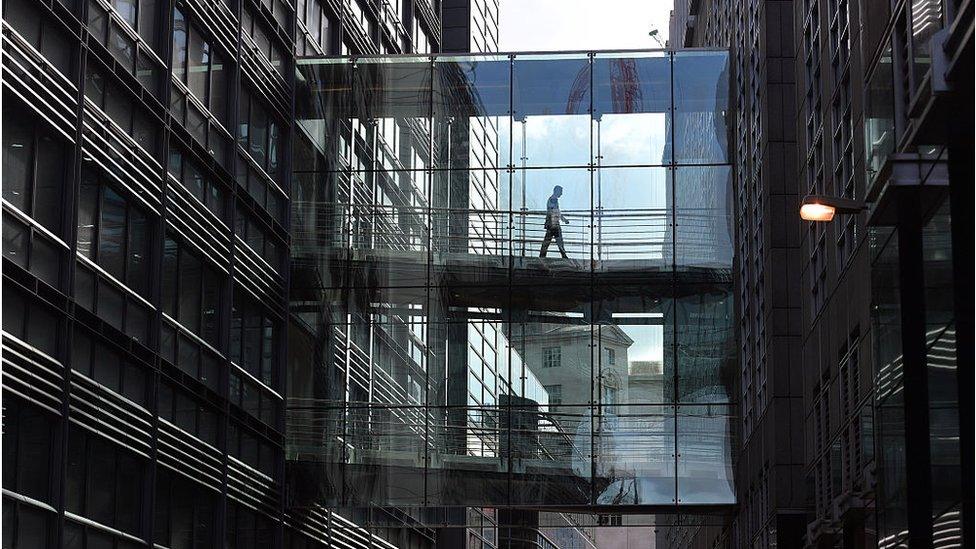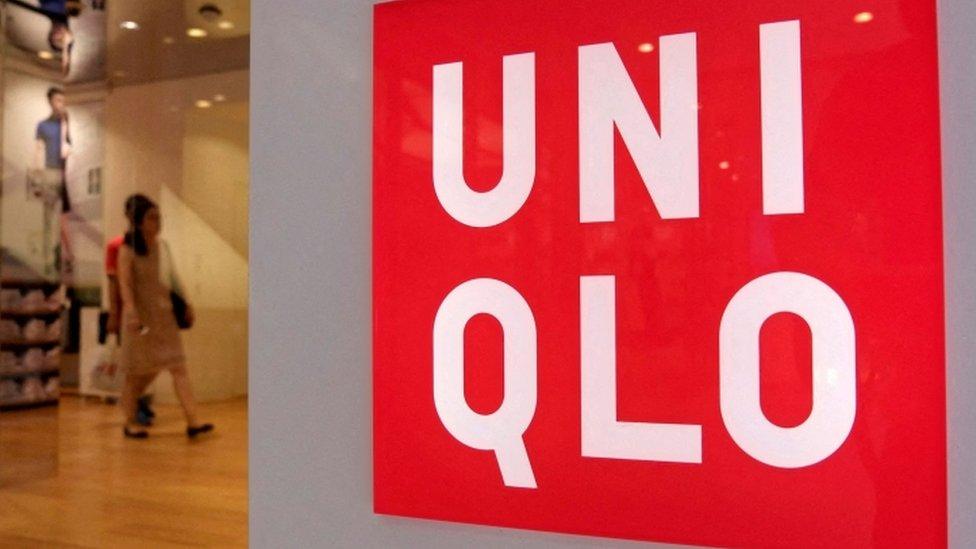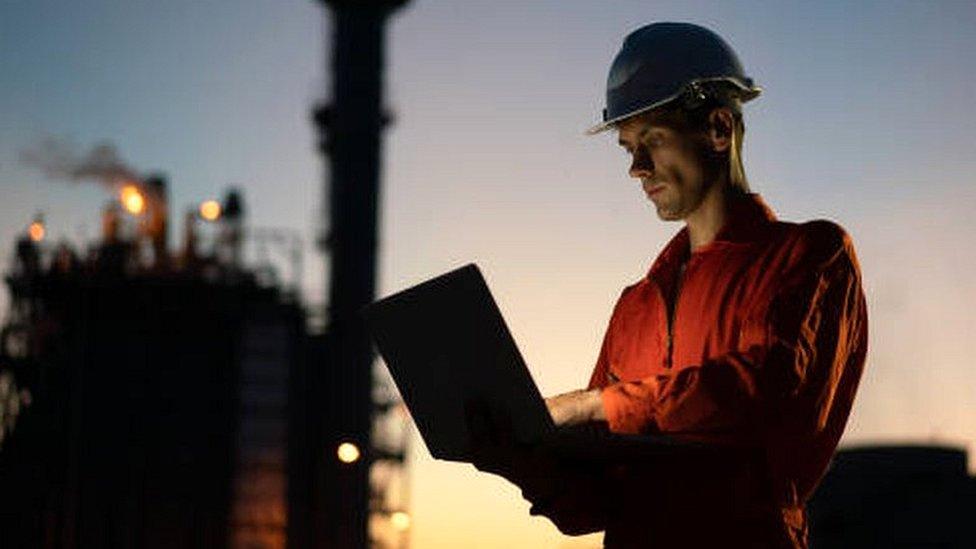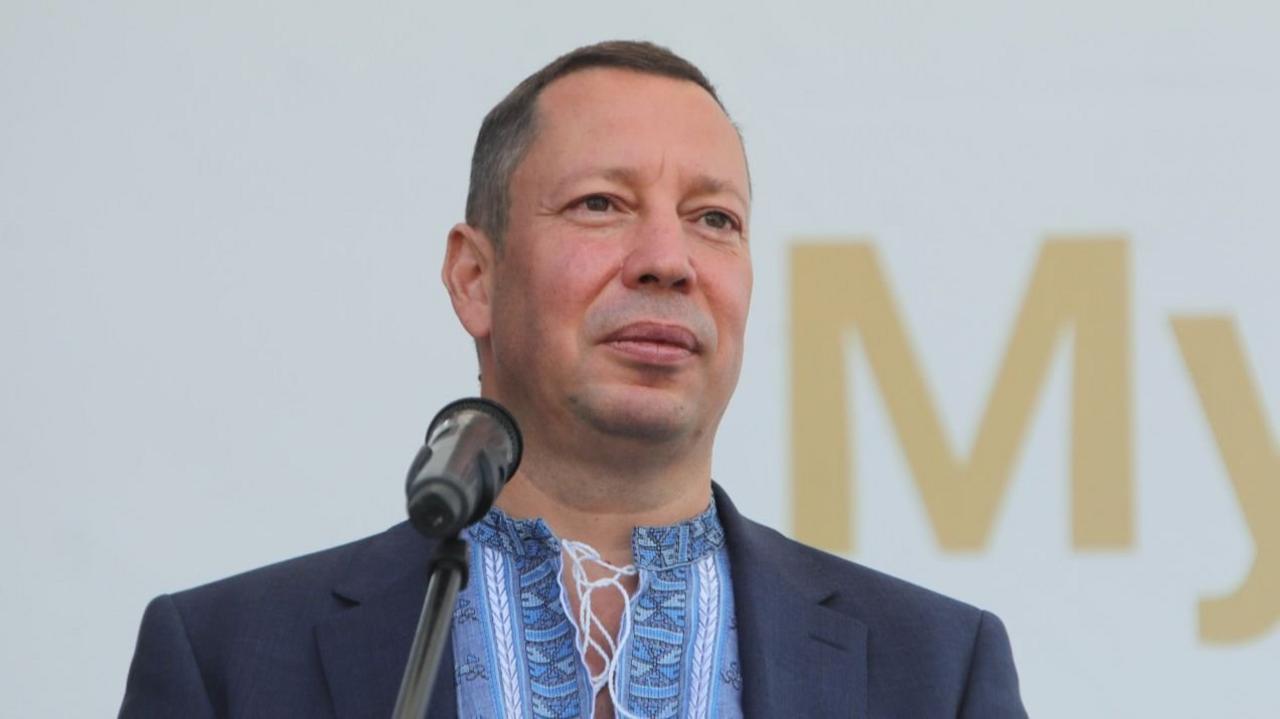Goldman Sachs and Western Union pull out of Russia
- Published
- comments

Richard Gnodde said the company remained committed to its London head office
Goldman Sachs has said it will close its operations in Russia, becoming the first Wall Street bank to pull out of the country in response to the invasion of Ukraine.
Money transfer giant Western Union has also said it will suspend operations in Russia and Belarus.
The firms join a rush of global brands halting operations in Russia.
Earlier on Thursday, the owner of Uniqlo made a U-turn and decided to suspend operations in the country.
Sanctions bite
Operating in Moscow has been increasingly difficult for Western financial institutions and other firms amid international sanctions against Russia.
More than 330 firms have withdrawn or significantly curtailed operations in the country in recent days, according to Yale researchers, who have been tracking the corporate response.
On Thursday, Goldman Sachs said it would be "winding down" its business in Russia rather than leaving immediately.
The bank said it was doing so "in compliance with regulatory and licensing requirements".
At the end of 2021, Goldman Sachs' total credit exposure in Russia was $650m (£496m).
Later Thursday, fellow Wall Street giant JP Morgan Chase also said it was "actively unwinding Russian business", with activities focused on taking care of staff and helping global clients manage risk and close out obligations.
Meanwhile Western Union said it "stands with the world in condemning the unprovoked and unjustified invasion of Ukraine".
"Ultimately, in light of the ongoing tragic impact of Russia's prolonged assault on Ukraine, we have arrived at the decision to suspend our operations in Russia and Belarus," the company said.
The action is a further blow to flows of money in Russia. Western Union provides international money transfer and payments services in more than 200 countries and 130 currencies.
In an interview with the BBC published today, Ukrainain Central Bank Governor Kyrylo Shevchenko had called on Western Union to "cease deliveries of cash to Russian and Belarusian banks."
Change of direction
Earlier on Thursday, Uniqlo owner Fast Retailing said it had decided to change its stance on continuing trading in Russia.
It said it was faced with "operational challenges" due to the "worsening of the conflict situation" after Russia's invasion of Ukraine.
Earlier in the week it had said it would keep its Russian shops open, saying that clothing is a "necessity of life".
But in its latest statement, it said Uniqlo could "no longer proceed" in Russia.

"Uniqlo has made everyday clothing available to the general public in Russia," it said.
"However, we have recently faced a number of difficulties, including operational challenges and the worsening of the conflict situation. For this reason, we will temporarily suspend our operations."
Corporate pull-back
Among the latest wave of companies to call a halt to trading or pull back from investing in Russia, Rio Tinto became the first major mining company to cut ties with Russian businesses, while Japan's Sony and Nintendo suspended deliveries of gaming consoles.
The world's biggest insurance broker, New York-listed Marsh McLennan, also announced it would exit Russia on Thursday. Ownership of its Russian businesses will be transferred to local management that will be independently operated, the group said.
Japanese firm Hitachi said it would stop exports and cease most operations, external in Russia except for vital electrical power facilities, following similar moves by US companies such as Caterpillar.
"We took multiple factors including the supply chain situation into account," a Hitachi spokesperson said.
Ukraine's Vice Prime Minister Mykhailo Fedorov had been urging the suspension, external.
Entertainment giant Sony, which had already stopped releasing films in Russia, suspended the launch of racing game "Gran Turismo 7".
Food companies Nestle, Mondelez, Procter & Gamble and Unilever have halted investment in Russia, but said they would continue providing essentials.
Fast food slowdown
McDonald's said on Tuesday, external that it would temporarily close its 847 Russian outlets.
The fast food giant has said that the move, which includes continuing to pay its 62,000 staff and restaurant employees in Russia, will cost about $50m (£38m) a month.
"This is a really challenging and complex situation for a global company like us," said chief financial officer Kevin Ozan.
A number of other US food retailers, including Starbucks, PepsiCo and Coca-Cola Co, have said they will stop some or all business in Russia following the Ukraine invasion.
Meanwhile Burger King has suspended all of its corporate support, marketing and investment in Russia. But as its Russian outlets are fully franchised, many will remain open as they are managed by local franchisees.
Nationalisation warning
On Thursday, Russia's Izvestia newspaper reported that the Russian government had put together a list of about 60 foreign companies that could be nationalised in response to the suspension of operations.
It said firms including Apple, Ikea, Microsoft, IBM, Shell, McDonald's, Porsche, Toyota and H&M could have their accounts and assets seized, and "external management" brought in, BBC News Moscow producer Will Vernon said., external
It is unclear how the nationalised companies would be able to sell the products associated with those firms.
In response to Western sanctions, Russia has imposed export bans on a string of products until the end of 2022.
The ban covers exports of telecoms, medical, vehicle, agricultural, and electrical equipment, as well as some forestry products such as timber.
Call for help
Meanwhile in the UK, the CBI business lobby group called for government support as Western economies cope with the repercussions from Russia's invasion of Ukraine.
The CBI said it "fully supports" the sanctions that have been placed on Russia "despite their cost".
But its director general Tony Danker said the UK government must help businesses cope with the fallout such as rising energy costs and inflation as well as any impact on investment.
He said the UK and other countries "now need to confront the economic consequences of unwinding from Russia".
The CBI wants the government to "fast-track progress on some of the big policy issues and help firms invest".
Mr Danker called for an acceleration of renewable energy and government support on energy bills, especially for energy intensive industries.
He also asked for the UK government "to stand behind domestic oil and gas in our energy transition" while the country should also "identify new trading partners" for minerals and other commodities, and enhance cyber security.

War in Ukraine: More coverage
OCCUPIED CITY: 'We are not co-operating'
RUSSIA MOTHERS: 'How do I get my soldier son back?'
EXPLAINED: Why Putin has invaded Ukraine?
IN DEPTH: Full coverage of the conflict

Related topics
- Published10 March 2022

- Published10 March 2022
